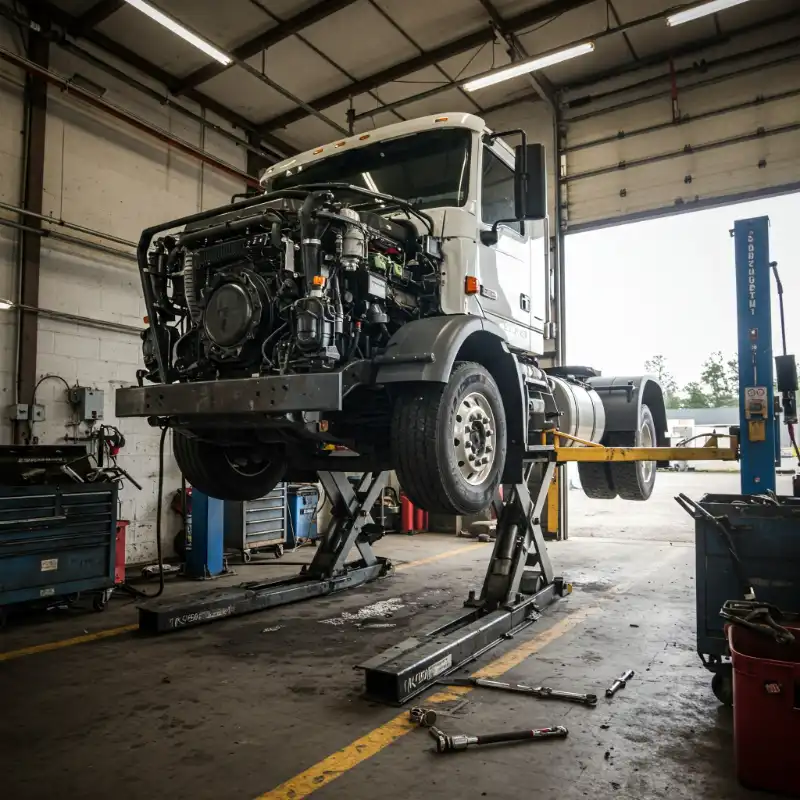Introduction
Cold winter weather poses a significant challenge for heavy-duty trucks, especially when it comes to fuel gelling. As temperatures drop, diesel fuel becomes prone to a phenomenon known as fuel gelling, which can have detrimental effects on the performance and efficiency of diesel engines. This blog will discuss the technical aspects of fuel gelling and its common causes. Most importantly, we will provide actionable strategies for truck owners, fleet managers, and those in the commercial trucking industry to prevent this issue.
Understanding Fuel Gelling
Fuel gelling is a complex process intricately tied to the molecular composition of diesel fuel. As temperatures drop, the paraffin waxes inherent in diesel fuel begin to crystallize, initiating a metamorphosis from a liquid state to a gel-like substance. This transformation is not merely a chemical reaction; it's a manifestation of the intricate dance between temperature and molecular structures. The crystallization of waxes, a natural component of diesel fuel, leads to the formation of microscopic structures that interlock, eventually creating a gel-like mass.
In the chilling embrace of winter, these wax crystals solidify, evolving into a formidable obstacle within the fuel system. The ramifications extend beyond mere inconvenience; they pose a tangible threat to engine functionality. Fuel flow obstruction can impede the engine's efficiency, potentially resulting in operational failures, reduced performance, and increased maintenance costs. Thus, comprehending the nuanced science behind fuel gelling becomes imperative for truck owners and fleet managers navigating the challenges of winter weather.
Common Causes of Fuel Gelling
To effectively address fuel gelling, it is crucial to understand the contributing factors. The following are common causes of fuel gelling:
- Low Temperatures: Diesel fuel contains paraffin waxes that solidify at lower temperatures. In cold climates, these waxes can form gel-like structures, impeding the fuel's ability to flow smoothly.
- Water Content in Fuel: Water content in diesel fuel can accelerate the formation of wax crystals. As water freezes, it provides a nucleus for wax crystallization, exacerbating the gelling process.
- Type of Diesel Fuel: Different regions use varying formulations of diesel fuel based on climate. Winter diesel fuel is treated with anti-gelling additives to prevent fuel gelling in colder temperatures. Using summer diesel fuel during winter can increase the risk of gelling.
- Regions Prone to Cold Weather: Areas with extreme cold weather are more susceptible to fuel gelling. Fleet managers operating in such regions must take additional precautions to prevent gelling-related issues.
Choosing the Right Winter Diesel Fuel
Selecting the appropriate winter diesel fuel is a critical step in preventing fuel gelling. Here are key considerations:
Anti-Gelling Additives
Winter diesel fuel is treated with anti-gelling additives that alter the crystallization process, preventing the formation of large wax structures. Ensure that the fuel used in your trucks is equipped with these additives.
Differences Between Summer and Winter Diesel
Summer diesel has a lower cloud point, which is the temperature at which wax crystals begin to form. Winter diesel is formulated to have a lower cloud point, making it suitable for colder temperatures. Using the right fuel for the season is paramount.
Fuel Additives and Treatments
To further fortify diesel fuel against gelling, various additives and treatments are available:
- Pour Point Depressants: These additives modify the wax crystal formation, lowering the pour point and improving the fuel's flow characteristics at colder temperatures.
- Cold Flow Improvers: Cold flow improvers enhance the low-temperature operability of diesel fuel by modifying the size and structure of wax crystals.
- Fuel De-Icers: Addressing water content, fuel de-icers prevent water-induced gelling by dispersing or emulsifying water in the fuel.
- Regular Testing and Treatment: Implement a proactive approach by regularly testing fuel for susceptibility to gelling and treating it accordingly. The frequency of treatment should align with the severity of winter conditions.
Practical Tips for Winter Truck Operation
Beyond fuel specifications and additives, adopting practical measures is essential to prevent fuel gelling during winter. Here are actionable tips:
- Optimal Idling Practices: Encourage truck drivers to minimize idling time during extremely cold weather. Idling contributes to lower fuel temperatures and increases the risk of gelling.
- Fuel Filter Maintenance: Regularly inspect and replace fuel filters to prevent clogging. A clean fuel filter is crucial for maintaining proper fuel flow, reducing the chances of gelling.
- Insulation Solutions for Fuel Lines: Install insulation on fuel lines to retain heat and prevent the fuel from cooling excessively. This can be particularly beneficial in regions with extremely low temperatures.
- Routine Vehicle Maintenance: Emphasize the importance of overall vehicle maintenance, including checking and maintaining the heating system, to ensure optimal performance during winter. Click here to learn more about our preventive maintenance services.
Recap
Preventing fuel gelling in heavy-duty trucks during winter requires a multi-faceted approach. Understanding the science behind fuel gelling, addressing common causes, choosing the right winter diesel fuel, employing additives and treatments, and adopting practical operational tips are all integral components of a comprehensive strategy. By incorporating these measures into your winter maintenance routine, truck owners and fleet managers can safeguard their vehicles against the adverse effects of fuel gelling, ensuring reliable and efficient operation even in the harshest winter conditions.










.webp)





























